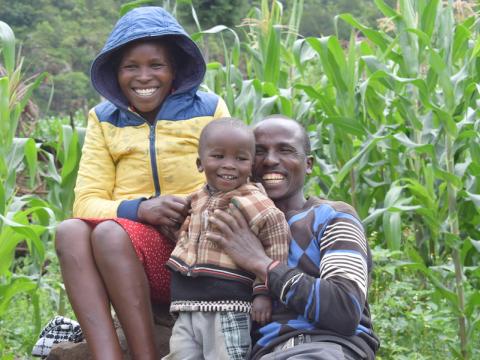Men Care Groups Transforming Marriages and Improving the Well-being of Children

By Sarah Ooko, World Vision Senior Communications Officer, Kenya
Rashford - aged two years - is a happy child. It takes little to cheer him up. At the slightest opportunity, he will smile, giggle or laugh while interacting with people.
His parents, Meshack and Abigael are not any different. Their jovial, warm and welcoming spirit make their family a joy to be around, at their home in Elgeyo Marakwet County, Kenya.

From their animated conversations, shared laughter and affectionate gestures, one can easily tell that the couple enjoys a happy marriage, which is strengthened by their love for each other and friendship.
The close relationship that Meshack has with his wife and child is rare in most rural communities, where people still abide by value systems that frown upon such relations.
Cultural beliefs of the traditional African society, which have been passed down through generations, dissuade men from expressing their affections or emotions openly.
Men are socialised to be macho and aloof. Those that fail to abide by these dictates are considered weak and not 'man' enough.

Other than providing for their families, men are not required to play an active role, or get involved in child care and the personal lives of their spouses. Such roles are left to women.
Having been raised in the traditional African family set-up, Meshack got into marriage with similar perceptions about family life.
But his worldview began to change when his wife became pregnant with their son, about two years ago.
During one of her antenatal care visits or pregnancy check-ups at a local health facility, Abigael was informed about a Men Care Group that the hospital was supporting - in collaboration with the Elgeyo Marakwet County Health Department and World Vision Kenya’s ENRICH programme which is funded by Global Affairs Canada.
“I was encouraged to request my husband to join the group and I took the message home. I convinced Meshack and he accepted to do it,” says Abigael.

The Men Care model or approach is a global fatherhood campaign. It seeks to enhance the involvement of men in their families as equitable, responsive and non-violent fathers or spouses who promote gender equality and seek to improve the well-being of all children, both boys and girls.
The Men Care groups meet regularly to discuss and learn about childcare, maternal and reproductive health matters, good parenting skills and the significance of strong marriages to the overall well-being of children and families.
In addition, the groups offer a platform for critical reflection on cultural and gender norms that perpetuate the devaluation of girls and women in the society, while serving as obstacles that impede men's participation – as involved fathers - in family life.
Meshack notes that the Men Care group sessions helped him to understand and appreciate the importance of being fully involved in the day-to-day life of his wife and child.

The training he received opened his mind and motivated him to approach marriage life differently, without relying on past traditions and beliefs.
Thanks to the knowledge gained through the discussions, Meshack began viewing his wife as an equal partner in their relationship and not as someone who was under his power and control.
"My wife was pregnant at the time. So I began listening to her and finding out how she was feeling each day. Whenever she was tired or feeling overwhelmed, I would help with the house chores and allow her to rest," he says.
"At times she would feel low or have mood swings. But I would be understanding and patient with her, since we had been taught about pregnancy challenges in our Men care group," adds Meshack.

Beyond the house, Meshack also began accompanying Abigael to hospital for pregnancy check-ups and health talks.
"On the day she gave birth to our son Rashford, I was in the delivery room with her. And it brought me so much joy to see our child. This is not something that our culture allows men to do. But I chose to do it after becoming empowered.
As a result of being caring and supportive, Meshack enabled Abigael to open up and talk freely about issues bothering her. This strengthened their relationship and friendship.

Above all, the couple was able to raise their son Rashford in loving environment, which has made him a confident and happy child.
"I consider Rashford as our son; both of us are responsible for his life and happiness. Together we ensure that he is well taken care of. We have made sure that he gets nutritious food and he received all the required vaccines," says Meshack.
Aside from childcare, the couple also consults each other before making family decisions such as household budgets, business ventures to pursue and agricultural produce to grow.

Abigael is currently expecting their second child and Meshack is once again walking with her in the pregnancy journey.
"When COVID-19 came, I was scared because we were told that it is bad for pregnant women and can harm the mother and the child she's carrying," says Abigael.
She adds: "I was so stressed and wanted to just stay indoors and never leave the house. But my husband encouraged me to continue going for pregnancy check-ups at the hospital. He promised that all would be well, so long as I wore a mask, washed hands and kept a distance from people. We prayed and I felt much better."

Meshack's family is among the many that have immensely benefitted from Men Care groups in Elgeyo Marakwet County. Assessments done show that the groups have enabled more men - including leaders - to appreciate the role of women in development.
Most importantly, Men Care groups have improved maternal and child health through increases in hospital delivery, immunisation uptake, well nourished children, family planning and adherence to good hygiene and sanitation practises.